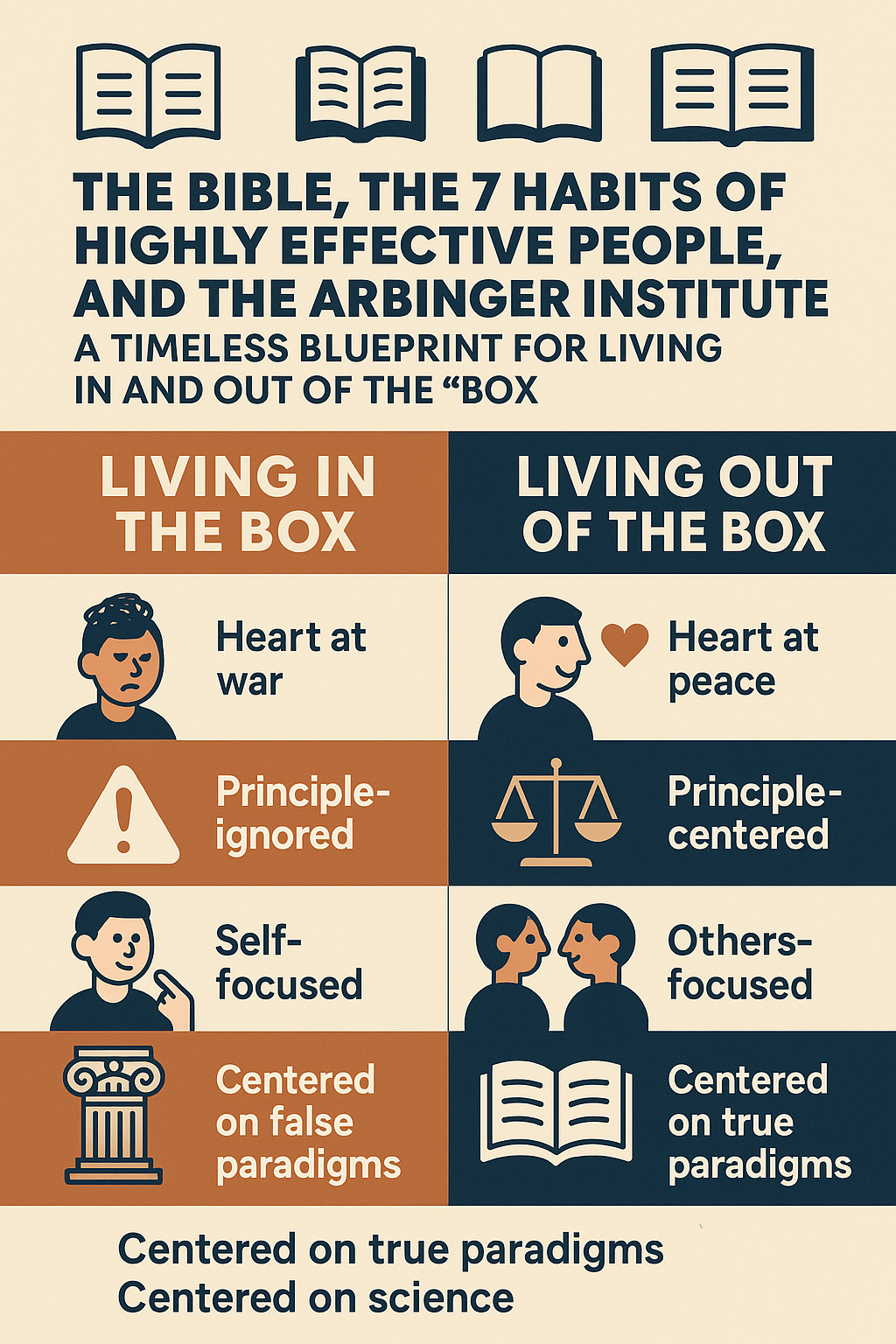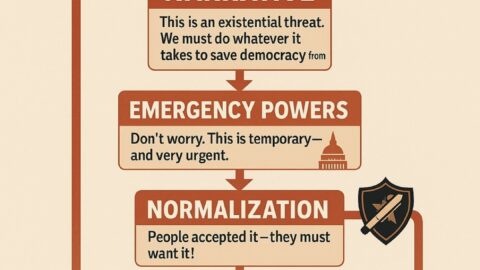Throughout human history, there have been efforts to distill principles of successful, honorable, and meaningful living. Though thousands of years apart, the Bible, Stephen R. Covey’s The 7 Habits of Highly Effective People, and The Arbinger Institute’s teachings (Leadership and Self-Deception, The Anatomy of Peace) all deliver remarkably parallel lessons: they teach how to live principle-centered lives, whether framed spiritually, morally, emotionally, or socially.
The Bible was never intended to be simply a “religious” text or a collection of ritualistic practices. Instead, it presents an entire way of life—a culture of thought, behavior, interaction, and moral excellence, rooted in truth, love, humility, responsibility, and transformation.
Similarly, Covey’s and Arbinger’s works, though written for a modern audience, mirror the ancient biblical wisdom in principles and practices.
Living “Inside the Box” vs. Living in Sin
The Arbinger Institute describes being “in the box” as a self-deceptive state, where we justify bad behavior, blame others, and see people as objects instead of individuals with hopes and needs. When inside the box:
- We make excuses.
- We are driven by pride, anger, and self-justification.
- We reinforce distorted perceptions of reality.
This closely parallels the biblical concept of sin: a condition of the heart where man turns inward, away from God and neighbor, becoming selfish, hardened, and deceitful.
Being out of the box, in Arbinger terms, means seeing others as people again—recognizing their humanity, and responding with compassion and humility. This echoes Christ’s central teaching of loving God and loving your neighbor as yourself (Matthew 22:37–40).
The 7 Habits: A Modern Blueprint for a Biblical Lifestyle
Covey’s 7 Habits align directly with biblical values:
- Be Proactive (Self-Mastery):
→ “He who rules his spirit is better than he who conquers a city.” (Proverbs 16:32) - Begin with the End in Mind (Purpose-Driven Life):
→ “Where there is no vision, the people perish.” (Proverbs 29:18) - Put First Things First (Priorities & Integrity):
→ “Seek first the kingdom of God and His righteousness.” (Matthew 6:33) - Think Win-Win (Mutual Benefit and Compassion):
→ “Do to others as you would have them do to you.” (Luke 6:31 – the Golden Rule) - Seek First to Understand, Then to Be Understood (Empathy and Listening):
→ “Everyone should be quick to listen, slow to speak, and slow to become angry.” (James 1:19) - Synergize (Unity and Fellowship):
→ “Though one may be overpowered, two can defend themselves. A cord of three strands is not quickly broken.” (Ecclesiastes 4:12) - Sharpen the Saw (Restoration and Renewal):
→ God established the Sabbath for renewal and restoration (Exodus 20:8–11).
Each of Covey’s habits modernizes an ancient principle of human flourishing already laid out in Scripture.
Principle-Centered Life vs. Life-Centered Paradigms
Both Covey and the Bible warn against living based on “life centers” like:
- Money
- Possessions
- Power
- Pleasures
- Other people’s opinions
Instead, they encourage living by unchanging principles:
- Justice
- Mercy
- Humility
- Integrity
- Love
- Truth
In The 7 Habits, a principle-centered life is the only stable foundation, mirroring Christ’s parable of the wise man who built his house upon the rock (Matthew 7:24-27).
Transformation of the Heart
At its core, the Bible focuses on the transformation of the inner man:
“Be transformed by the renewing of your mind.” (Romans 12:2)
Similarly, Arbinger teaches that to solve external conflicts (family, work, nation), we must first change our inner perceptions and self-deceptions. Transformation is internal before it is external.
Freedom and Responsibility
The Bible teaches that freedom is not doing whatever we want, but choosing righteousness (Galatians 5:13).
Covey frames freedom as the space between stimulus and response, where responsibility (response-ability) lives.
Likewise, Arbinger teaches that we are not victims of our circumstances, but agents with the freedom to live truthfully and authentically, seeing and loving others.
Conclusion: The Timelessness of Principles
The Bible, Covey’s 7 Habits, and Arbinger’s Inside the Box teachings all proclaim a foundational truth:
The only path to a free, flourishing, and meaningful life is through principle-centered living, humility, love, and the continual transformation of the self.
Modern programs simply echo the ancient wisdom already given by God — a wisdom desperately needed in today’s world of distraction, deception, and self-centeredness.
Ultimately, whether ancient or modern, these teachings form a seamless pattern:
Live for principles. Love others. Transform yourself. Walk the higher path.







